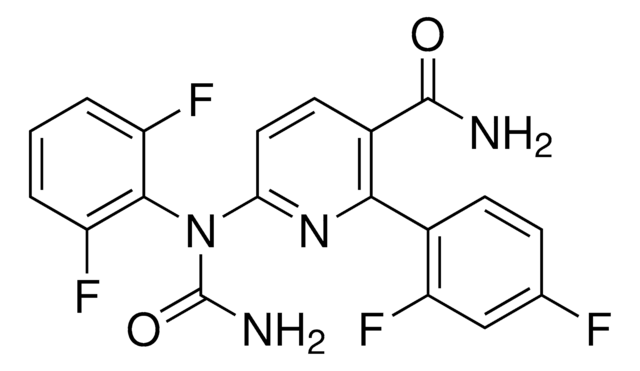V4758
Monoclonal Anti-Vascular Endothelial Growth Factor antibody produced in mouse
clone 26503, purified immunoglobulin, lyophilized powder
Sinónimos:
Anti-VEGF
About This Item
Productos recomendados
biological source
mouse
Quality Level
conjugate
unconjugated
antibody form
purified immunoglobulin
antibody product type
primary antibodies
clone
26503, monoclonal
form
lyophilized powder
species reactivity
primate, human
technique(s)
capture ELISA: 2-8 μg/mL
neutralization: suitable
western blot: 1-2 μg/mL
isotype
IgG2b
UniProt accession no.
storage temp.
−20°C
target post-translational modification
unmodified
Gene Information
human ... VEGFA(7422) , VEGFB(7423) , VEGFC(7424)
General description
Immunogen
Application
Western Blotting (1 paper)
Biochem/physiol Actions
Physical form
Disclaimer
¿No encuentra el producto adecuado?
Pruebe nuestro Herramienta de selección de productos.
Storage Class
11 - Combustible Solids
wgk_germany
WGK 3
flash_point_f
Not applicable
flash_point_c
Not applicable
ppe
Eyeshields, Gloves, type N95 (US)
Certificados de análisis (COA)
Busque Certificados de análisis (COA) introduciendo el número de lote del producto. Los números de lote se encuentran en la etiqueta del producto después de las palabras «Lot» o «Batch»
¿Ya tiene este producto?
Encuentre la documentación para los productos que ha comprado recientemente en la Biblioteca de documentos.
Nuestro equipo de científicos tiene experiencia en todas las áreas de investigación: Ciencias de la vida, Ciencia de los materiales, Síntesis química, Cromatografía, Analítica y muchas otras.
Póngase en contacto con el Servicio técnico








